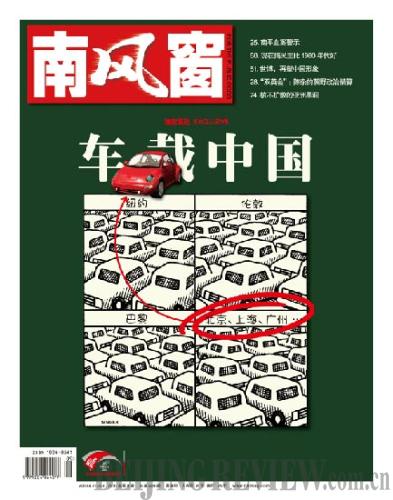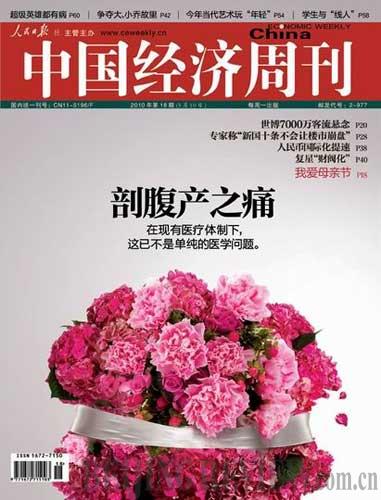|
 |
|
Globe |
Globe
Cultural Domination
May 11, 2010
Culture is a notion that is usually seen in a spiritual sense rather than material sense. Nevertheless, when the famous scholar Joseph Nye enlightened the world with the notion of "soft power," people start to be aware that culture can be a significant factor for nations to achieve political and economic success.
Since the 1950s, Americans have started to sell their cultural concepts along with their commodities. American culture has successfully taken the dominant place globally as the U.S. brands such as McDonald's, Coca Cola and Nike spread across the world.
However other developing cultural forces such as China, Southeast Asia, India, and Brazil present strong challenges, especially with new media breaking down barriers among countries. A cultural battle is growing worldwide in the areas of film, television programs, cartoons and fashion designs. Countries can hardly resist the invasion of American cultural icons such as Avatar and Lady Gaga, but everyone is making efforts to create their own such icons. China is no exception. But Chinese media researchers think China now should identify their own values, and then find the proper way to promote itself so as to win a place in the cultural battle.
 |
|
Nanfeng Chuang |
Nanfeng Chuang
Cars Rule
April 26, 2010
In the past decade, China has become an "auto society". In 2009, China's automobile sales surged 46 percent to 13.6 million units, helping China overtake the United States to be the world's biggest auto market. Despite being haunted by the global financial crisis, China's automotive industry boom is effectively stimulating domestic demand and promoting the development of related industries such as steel, tire, plastic, leather and glass. More importantly, it marks the arrival of the age of mass consumption in automobiles.
An auto society will bring about changes in many social settings including the travel, residential choice, urban and rural structure, and even the consumption structure and business operation. Accordingly, it will cause social problems, such as air pollution, energy wastage, and traffic jams. Being a bicycle country traditionally, China has yet to have a long-term plan for the automotive industry. Therefore, it is imperative for the government to attach importance to changes posed by the advent of an auto society.
 |
|
China Economic Weekly |
China Economic Weekly
Caesarean Births Flourish
May 10, 2010
A survey by the World Health Organization revealed earlier this year that nearly half of all births in China are delivered by cesarean section (C-section), the world's highest rate, while the recommended level is no more than 15 percent. Natural birth is medically believed to be the ideal way of delivery and C-sections should be performed only when a vaginal delivery may put the baby's or mother's life or health at risk.
Reasons for elective C-sections are varied in China, as in many cases hospitals and expectant mothers have different considerations when they have to make a decision between vaginal birth and C-sections. Financial incentives motivate some hospitals to perform C-sections, and some doctors recommend surgery to women for this reason. Avoiding medical disputes is also an important reason that drives doctors to recommend C-sections. As for expectant mothers, most of them choose caesarean births due to the fear of pain or hoping to choose a "lucky" delivery date or year. China's caesarean rate was steady at 5 percent between 1950s and 1970s. However, it has rapidly increased since the 1980s.
Beijing Times
Destroyed Wheatfields
May 3, 2010
Hongniwan Township in Nanyang, Henan Province, recently uprooted about 70 hectares of wheat along an expressway to plant trees allegedly in preparation for the National Farmers Games in 2012. The township also planned to afforest another 300 hectares of land, most of which are arable. Who had made the plan? Of course it was not local farmers, because farmland is what they live on.
China is the only country in the world that holds National Farmers Games, which reflects the government's concern for farmers' health. If the Games does not add to farmers' well being but damages their interests, do we still need it? Besides, according to state laws and regulations, farmland is strictly protected, and should not be used for other purposes, including tree planting. If local officials had taken the side of farmers, they would not have ordered the destruction of wheatfields. Unfortunately, they have attached more importance to a vanity project.
Guangzhou Daily
Excessive Volunteering
May 7, 2010
During May Day holidays, a large number of volunteers rushed to elderly homes in Foshan, Guangdong Province, to help the inmates. But the volunteers outnumbered those they wanted to help.
Volunteer service in China is only a few years old. Although volunteer organizations are mushrooming, most of them are active only during big events, such as the Beijing Olympic Games and the Shanghai World Expo, or occasionally serve elderly homes and nursing homes for disabled children during holidays. Regular service is still rare.
In Western countries, where volunteer service first appeared, volunteers work round the clock in areas such as tutoring, poverty reduction and health services. They have well-developed institutions that are responsible for training and recruitment of volunteers. If we have similar organizations, which know clearly where volunteer service is needed, volunteers will not all rush to homes for the elderly. Besides, if volunteer service focuses mainly on big events and celebrations, it goes against the spirit of making unselfish contributions.
Changjiang Daily
No Outside Food
May 1, 2010
The public has long criticized an unspoken rule in the catering sector that customers are not allowed to bring their own alcohol to restaurants. But it very nearly became an official ban in Wuhan, Hubei Province. In early April, the local association of consumers, together with the chambers of restaurant operators and private businesses, issued a notice recognizing restaurants' right to deny food and drink being brought in from outside.
This news has triggered strong criticism. Under public pressure, the Wuhan Consumers' Association later admitted the provision was inconsiderate and pledged to revise it as soon as possible.
Although those working on the document explained the stipulation was made to ensure food safety and restaurant operators had always argued they had the right to deny outside food, from the consumers' perspective, giving discretionary power on this issue to restaurateurs is undoubtedly unfair, because alcohol and soft drinks in restaurants sometimes sell at up to four times normal retail prices.
Consumers' associations are set up to supervise the protection of consumers' legitimate rights and interests. That is to say, they must not take the side of businesses against consumers.
|